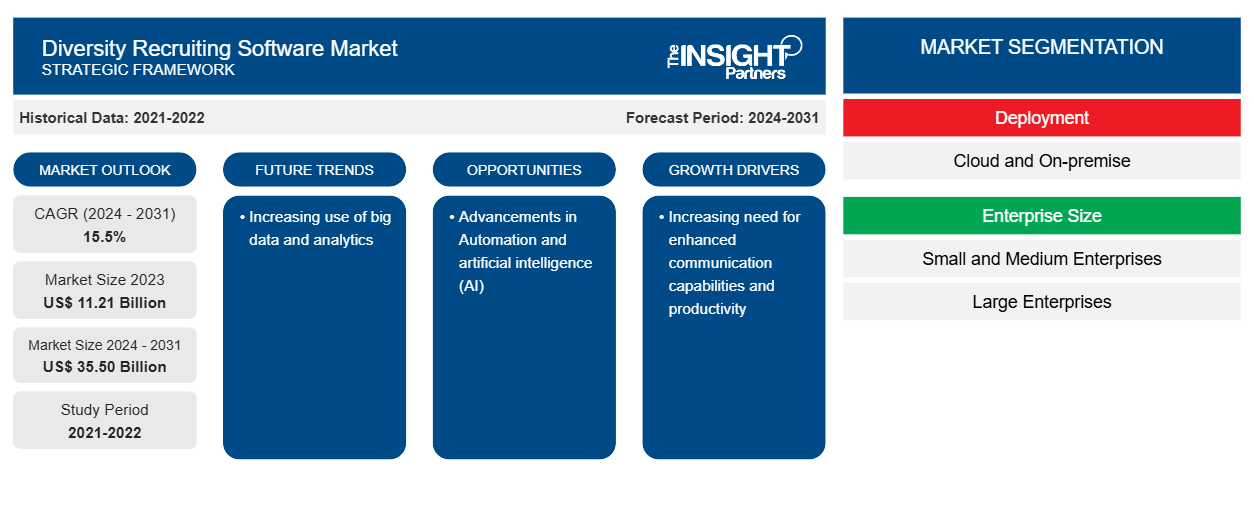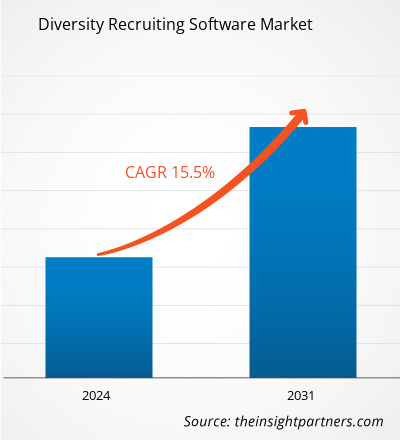Diversity Recruiting Software Market Key Players and Opportunities by 2031
Diversity Recruiting Software Market Size and Forecast (2021 - 2031), Global and Regional Share, Trend, and Growth Opportunity Analysis Report Coverage: By Deployment (Cloud and On-premises), Enterprise Size (Small and Medium Enterprises (SMEs) and Large Enterprises), and Geography
Historic Data: 2021-2022 | Base Year: 2023 | Forecast Period: 2024-2031- Report Date : Mar 2026
- Report Code : TIPRE00012762
- Category : Technology, Media and Telecommunications
- Status : Data Released
- Available Report Formats :


- No. of Pages : 150
The global diversity recruiting software market size is expected to grow from US$ 11.21 billion in 2023 to US$ 35.50 billion by 2031; it is anticipated to expand at a CAGR of 15.5% from 2024 to 2031. The increasing use of big data and analytics is likely to remain a key diversity recruiting software market trends.
Diversity Recruiting Software Market Analysis
The growing demand for improved communication and productivity is the primary driver of the diversity recruiting software industry. Recruiting software solutions, including as application tracking systems, promote communication by keeping both candidates and recruiters informed.
Diversity Recruiting Software Market Overview
Diversity recruiting software is a cutting-edge technological solution that improves and streamlines the recruitment process while encouraging diversity and inclusion inside an business. This program uses complex algorithms and data analytics to find and recruit a wide pool of competent individuals for job opportunities. One of the most important benefits of diversity recruitment software is its capacity to eliminate unconscious bias throughout the hiring process. The program uses artificial intelligence and machine learning to scan job descriptions and identify potential biases, such as gender-specific language or age-related preferences, ensuring that job advertisements are inclusive and appealing to a diverse range of candidates. Furthermore, the program allows recruiters to reach a larger audience by automatically advertising job postings on numerous diversity-focused job sites.
Customize This Report To Suit Your Requirement
Get FREE CUSTOMIZATIONDiversity Recruiting Software Market: Strategic Insights

-
Get Top Key Market Trends of this report.This FREE sample will include data analysis, ranging from market trends to estimates and forecasts.
Diversity Recruiting Software Market Drivers and Opportunities
Increasing need for enhanced communication capabilities and productivity to Favor Market
One of the primary aspects driving the diversity recruitment software industry is the growing demand for improved communication and productivity. Recruiting software solutions, like as application tracking systems, help to improve communication channels between candidates and recruiters, keeping them informed throughout the recruiting process. Effective communication is required for successful diversity recruitment. It enables recruiters to access a bigger pool of candidates and assures that all applicants, regardless of background, have an equal chance of being evaluated for a post. Using technology like as messaging apps, chatbots, and social media, recruiters may more effectively discover top talent, identify possible contacts, and communicate with candidates and workers.
Advancements in Automation and artificial intelligence (AI)
Organizations are increasingly using automated resume screening systems that rely on artificial intelligence (Al) to evaluate candidates' abilities and expertise. This trend is likely to accelerate and simplify the diversity recruiting process. Al-based technologies, like as Resume Scorer and Optical Character Recognition (OCR), are used to match candidates' resumes to the abilities and competencies required for a certain job. These technologies may recognize hard capabilities, job-related soft skills, and even applicant personality traits. Al eliminates mistakes associated with manually reviewing thousands of resumes by automating the screening procedure.
Diversity Recruiting Software Market Report Segmentation Analysis
Key segments that contributed to the derivation of the diversity recruiting software market analysis deployment and enterprise size.
- Based on deployment, the market is bifurcated into on-premises and cloud. The cloud segment held a larger market share in 2023.
- Based on enterprise size, the market is bifurcated into small and medium enterprises (SMEs) and large enterprises. The large enterprises segment held a larger market share in 2023.
Diversity Recruiting Software Market Share Analysis by Geography
The geographic scope of the diversity recruiting software market report is mainly divided into five regions: North America, Asia Pacific, Europe, Middle East & Africa, and South America/South & Central America. North America dominated the diversity recruiting software market in 2023. The growing need for software solutions that support diverse workforce recruitment and retention is driven by the recognition of the vital role diversity plays in the workplace. Organizations are investing in software solutions to facilitate their diversity and inclusion goals. In North America, this trend is further fuelled by the rising number of companies embracing diversity and inclusion initiatives. These organizations are seeking software solutions to effectively identify and attract diverse talent, as well as monitor and evaluate the success of their diversity programs.
Diversity Recruiting Software Market Regional Insights
The regional trends and factors influencing the Diversity Recruiting Software Market throughout the forecast period have been thoroughly explained by the analysts at The Insight Partners. This section also discusses Diversity Recruiting Software Market segments and geography across North America, Europe, Asia Pacific, Middle East and Africa, and South and Central America.
Diversity Recruiting Software Market Report Scope
| Report Attribute | Details |
|---|---|
| Market size in 2023 | US$ 11.21 Billion |
| Market Size by 2031 | US$ 35.50 Billion |
| Global CAGR (2024 - 2031) | 15.5% |
| Historical Data | 2021-2022 |
| Forecast period | 2024-2031 |
| Segments Covered |
By Deployment
|
| Regions and Countries Covered |
North America
|
| Market leaders and key company profiles |
|
Diversity Recruiting Software Market Players Density: Understanding Its Impact on Business Dynamics
The Diversity Recruiting Software Market is growing rapidly, driven by increasing end-user demand due to factors such as evolving consumer preferences, technological advancements, and greater awareness of the product's benefits. As demand rises, businesses are expanding their offerings, innovating to meet consumer needs, and capitalizing on emerging trends, which further fuels market growth.

- Get the Diversity Recruiting Software Market top key players overview
Diversity Recruiting Software Market News and Recent Developments
The diversity recruiting software market is evaluated by gathering qualitative and quantitative data post primary and secondary research, which includes important corporate publications, association data, and databases. The following is a list of developments in the market:
- In January 2021, SmartRecruiters introduced an important initiative called the Diversity Hiring Toolkit. This toolkit comprises a maturity model and success pillars, each consisting of three key standards. SmartRecruiters have carefully crafted these standards to create a top-notch framework for diversity recruitment efforts. As part of this toolkit, SmartRecruiters is encouraging companies to participate in the Diversity Hiring Assessment. This assessment offers a comprehensive and unbiased evaluation of a company's overall Diversity Hiring Maturity Level. It is suitable for companies of all sizes and industries and is recommended for individuals with a deep understanding of their company's Talent Acquisition, Marketing, and Diversity & Inclusion (D&I) initiatives.
(Source: SmartRecruiters, Press Release, 2021)
Diversity Recruiting Software Market Report Coverage and Deliverables
The "Diversity Recruiting Software Market Size and Forecast (2021–2031)" report provides a detailed analysis of the market covering below areas:
- Market size and forecast at global, regional, and country levels for all the key market segments covered under the scope
- Market dynamics such as drivers, restraints, and key opportunities
- Key future trends
- Detailed PEST/Porter's Five Forces and SWOT analysis
- Global and regional market analysis covering key market trends, major players, regulations, and recent market developments
- Industry landscape and competition analysis covering market concentration, heat map analysis, prominent players, and recent developments
- Detailed company profiles
Frequently Asked Questions
Ankita is a dynamic market research and consulting professional with over 8 years of experience across the technology, media, ICT, and electronics & semiconductor sectors. She has successfully led and delivered 100+ consulting and research assignments for global clients such as Microsoft, Oracle, NEC Corporation, SAP, KPMG, and Expeditors International. Her core competencies include market assessment, data analysis, forecasting, strategy formulation, competitive intelligence, and report writing.
Ankita is adept at handling complete project cycles—from pre-sales proposal design and client discussions to post-sales delivery of actionable insights. She is skilled in managing cross-functional teams, structuring complex research modules, and aligning solutions with client-specific business goals. Her excellent communication, leadership, and presentation abilities have enabled her to consistently deliver value-driven outcomes in fast-paced and evolving market environments.
- Historical Analysis (2 Years), Base Year, Forecast (7 Years) with CAGR
- PEST and SWOT Analysis
- Market Size Value / Volume - Global, Regional, Country
- Industry and Competitive Landscape
- Excel Dataset
Recent Reports
Related Reports
Testimonials
The Insight Partners' SCADA System Market report is comprehensive, with valuable insights on current trends and future forecasts. The team was highly professional, responsive, and supportive throughout. We are very satisfied and highly recommend their services.
RAN KEDEM Partner, Reali Technologies LTDsI requested a report on a very specific software market and the team produced the report in a few days. The information was very relevant and well presented. I then requested some changes and additions to the report. The team was again very responsive and I got the final report in less than a week.
JEAN-HERVE JENN Chairman, Future AnalyticaWe worked with The Insight Partners for an important market study and forecast. They gave us clear insights into opportunities and risks, which helped shape our plans. Their research was easy to use and based on solid data. It helped us make smart, confident decisions. We highly recommend them.
PIYUSH NAGPAL Sr. Vice President, High Beam GlobalThe Insight Partners delivered insightful, well-structured market research with strong domain expertise. Their team was professional and responsive throughout. The user-friendly website made accessing industry reports seamless. We highly recommend them for reliable, high-quality research services
YUKIHIKO ADACHI CEO, Deep Blue, LLC.This is the first time I have purchased a market report from The Insight Partners.While I was unsure at first, I visited their web site and felt more comfortable to take the risk and purchase a market report.I am completely satisfied with the quality of the report and customer service. I had several questions and comments with the initial report, but after a couple of dialogs over email with their analyst I believe I have a report that I can use as input to our strategic planning process.Thank you so much for taking the extra time and making this a positive experience.I will definitely recommend your service to others and you will be my first call when we need further market data.
JOHN SUZUKI President and Chief Executive Officer, Board Director, BK TechnologiesI wish to appreciate your support and the professionalism you displayed in the course of attending to my request for information regarding to infectious disease IVD market in Nigeria. I appreciate your patience, your guidance, and the fact that you were willing to offer a discount, which eventually made it possible for us to close a deal. I look forward to engaging The Insight Partners in the future, all thanks to the impression you have created in me as a result of this first encounter.
DR CHIJIOKE ONYIA MANAGING DIRECTOR, PineCrest Healthcare Ltd.Reason to Buy
- Informed Decision-Making
- Understanding Market Dynamics
- Competitive Analysis
- Identifying Emerging Markets
- Customer Insights
- Market Forecasts
- Risk Mitigation
- Boosting Operational Efficiency
- Strategic Planning
- Investment Justification
- Tracking Industry Innovations
- Aligning with Regulatory Trends




















 Get Free Sample For
Get Free Sample For